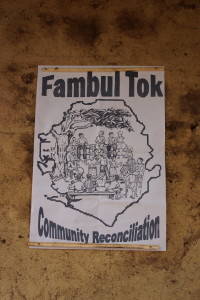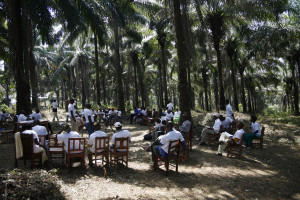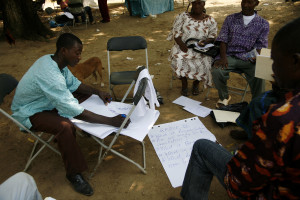Why do I tell this story now? Because it shows how creative, expectant, appreciative perspectives from outside a community in conflict can support that community as it works to build peace from within.
It was November 14, 2007. John Caulker and I gathered with a handful of trusted colleagues in the Carlyle Hotel in Washington, D.C. to plan the launch of an as-yet-unnamed program of community reconciliation in Sierra Leone. John and I had a vision and the draft of a program plan, and we wanted our core group to help solidify and strengthen it. With the different perspectives, expertise, and resources we all brought to that table, the work was smooth and rich. We struggled, however, when it came time to choose a name for the program.
I kicked off the conversation by asking what would a really BAD name might be like. This was easy for folks to answer: cerebral, confusing, disconnected from the mission, and one that gets morphed into a long and awkward acronym. Then I asked what a really GOOD name would be like. This was also easy to describe: something that conveys the spirit of the work directly; that invites people in; that emerges from the local culture and context; a visionary, positive, accessible and inspiring name.
And then we started throwing out possibilities. And somehow, they were all way too long, and would have yielded very long and awkward acronyms. Grassroots Community Healing and Reconciliation Project. Healing Sierra Leone: The Grassroots Community Reconciliation Project. And so on. While these all accurately described the program, none really captured our imaginations. We decided to take a break and just let it settle.
I can still remember the moment, as most of us refilled teacups or snagged a few more nuts, that John burst back through the door into the room.
“I’ve got it!” he announced, eyes bright, arms raised triumphantly. “Fambul Tok!”
We all stared a moment. We wanted to celebrate with John and affirm his inspiration, but we had no idea what he was saying … except for Usman Fornah, John’s colleague from Sierra Leone, who smiled in recognition
“Um … what does fambul tok mean?” the rest of us asked, somewhat sheepishly.
 John described the idea of fambul tok, or ‘family talk,’ as an ancient idea in Sierra Leone of coming together as a family to resolve problems through dialogue. This was, in fact, the very tradition he was drawing from in building this program, to do the work of mobilizing the resources within his culture to heal and reconcile.
John described the idea of fambul tok, or ‘family talk,’ as an ancient idea in Sierra Leone of coming together as a family to resolve problems through dialogue. This was, in fact, the very tradition he was drawing from in building this program, to do the work of mobilizing the resources within his culture to heal and reconcile.
The name was perfect, we quickly agreed—rooted in the culture, relevant to the work; an open invitation into practical and productive relationship that was personal as well as public and political. It carried the sensibilities of home and family into the broader community and public arena. Everyone in Sierra Leone would recognize it as their name. And one that could inspire pride in sharing with the rest of the world.
So why do I tell this story now? Because it shows in a microcosmic way the kind of creative, constructive accompanying roles outsiders can play to support communities as they work to build peace from within.
I certainly didn’t name Fambul Tok, nor did any of the American experts I’d gathered in that room. John Caulker found the perfect name for his grassroots peacebuilding program, yes. But together, the space we had made for that process to happen cleared the way.
Without this kind of a creative, inviting, appreciative space, Fambul Tok would likely not be called Fambul Tok. (Had it been left to us outsiders, it would no doubt have had a long, awkward acronym …) But we knew it ought to have a name like that, together we created a space for it, we invited it, and we knew it when it emerged. And this is what we saw: what we make space for, emerges.
And it has continued to do so, again and again. This clearing of space, this proactive and patient, inviting anticipation, has yielded the most incredible results.
The consultations that began the whole program in Sierra Leone illustrate this principle at work in a more macro way. The initial Fambul Tok staff took the fledgling program design and asked core questions in all 14 of Sierra Leone’s districts, bringing together a cross section of stakeholders from all parts of the district – men, women, Muslim, Christian, victims of the war and perpetrators, youth and elders, local officials and ordinary citizens. They asked: Do you want to reconcile? And then How do you want to do it? What resources do you already have to support the process? And finally, How can Fambul Tok walk with you in that process?


(photos (c) Sara Terry for Catalyst for Peace)
The energy to work for reconciliation that questions like this helped unleash is astonishing. Seven years later, I can confidently say that the people of Sierra Leone have spoken. They have created for the world a model of community-owned and led reconciliation whose implications reach far beyond post war justice mechanisms.
The answers are there. You need only clear the space to see them.
“Making space” when building peace is more than a clearing away to create a physical setting. It means removing the mental, emotional and even spiritual barriers that prevent us from truly coming together and unleashing our combined potential.
In settings of cyclical violence and endemic poverty, expectations grow limited and imagination can atrophy. Local communities can struggle to recognize, much less realize, the resources they hold within for reconciliation and healing. Those coming in from outside the community to help (whether internationally or from other parts of the country), can bring fresh eyes and a clear, appreciative and expectant vision. This perspective can be an invitation to clear out worn, stuck thoughts and to begin from a new space, seeing the resources already there more clearly.
Blog banner image (c) Sara Terry for Catalyst for Peace

